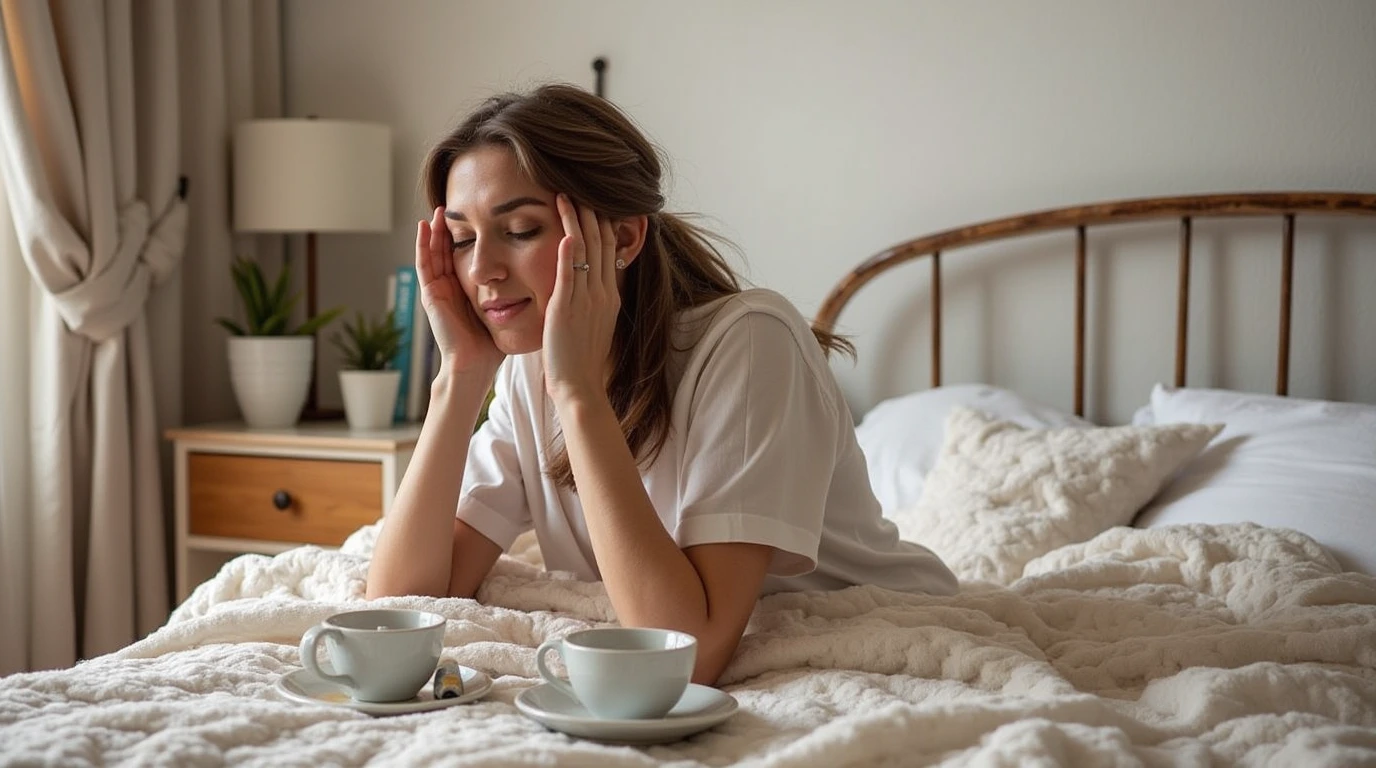We envision a world where everyone has the tools and knowledge to live a balanced, healthy, and fulfilling life. By providing reliable resources, personalized programs, and community support, we aim to be a beacon of hope for those on their health journey.
Table of Contents
Introduction to Stress, Anxiety, and Depression

Natural Remedies Stress Anxiety Depression
In contemporary society, stress, anxiety, and depression have emerged as significant mental health challenges affecting millions of individuals worldwide. These conditions, while distinct, often overlap in their manifestations and can severely impact one’s quality of life. Stress is a natural response to perceived threats and demands but can become detrimental when chronic. Common symptoms include irritability, fatigue, and headaches, resulting from prolonged exposure to stressors.
Anxiety, characterized by excessive worry and fear, can lead to both mental and physical symptoms such as restlessness, palpitations, and insomnia. learn: Morning Exercise: The Secret Habit of Highly1 Successful People; It can impede daily functioning and often coexists with stress, creating a cycle that exacerbates both conditions. On the other hand, depression presents itself as a persistent feeling of sadness, hopelessness, and a loss of interest in activities once enjoyed. Physical symptoms may include changes in appetite, fatigue, and sleep disturbances, which further complicate the experience of those suffering from this condition.
The prevalence of these mental health disorders in today’s fast-paced world necessitates effective intervention. Addressing stress, anxiety, and depression is essential not only for individual well-being but also for societal health. Conventional treatments typically involve psychotherapy and medication; however, they are not suitable for everyone and may carry side effects. As a result, many individuals are exploring alternative approaches to alleviate their symptoms.
This exploration highlights the importance of natural remedies, which can offer complementary support or serve as alternatives to traditional treatments. By understanding the complexities of stress, anxiety, and depression, we can better appreciate the need for diverse therapeutic approaches that cater to individual preferences and experiences. Throughout this blog post, we will delve into various natural remedies that can help in managing these conditions effectively.
The Importance of Natural Remedies
In recent years, there has been a growing emphasis on the significance of natural remedies in managing stress, anxiety, and depression. As individuals increasingly acknowledge the potential drawbacks associated with pharmaceutical treatments, many are seeking alternatives that align with a more holistic approach to mental wellbeing. Natural remedies, which include various herbs, dietary changes, and lifestyle modifications, are becoming popular options for those wishing to alleviate their mental health concerns responsibly.
The appeal of natural remedies stems primarily from the desire for non-pharmaceutical options that come with fewer side effects. While pharmaceutical treatments often provide quick relief, they can also lead to adverse reactions, dependency issues, and other complications that may not be suitable for all individuals. By incorporating herbal supplements, mindfulness practices, and other natural therapies, individuals can experience improved mental health outcomes without the risks associated with conventional medication.
Moreover, natural remedies can complement traditional mental health treatments. Many healthcare professionals now advocate for integrated approaches that combine both natural and pharmaceutical options to achieve optimal results. For instance, incorporating practices such as yoga, meditation, or nutritional adjustments can enhance the efficacy of prescribed medications, leading to a more effective management plan for stress, anxiety, and depression.
Another notable benefit of natural remedies is their cost-effectiveness. Many natural treatments, such as herbal teas or exercise regimes, are accessible and economical, making them a viable option for those who may not have the means to afford expensive medications or therapy sessions. This accessibility democratizes mental health treatment, allowing a broader segment of the population to seek the help they need.
In summary, natural remedies offer a valuable alternative in the treatment of stress, anxiety, and depression, encompassing a holistic approach to mental health. By recognizing their importance, individuals can engage in a more balanced and comprehensive strategy for managing their mental wellbeing.
Herbal Remedies for Anxiety and Depression

Herbal remedies have gained popularity over the years for their potential to alleviate symptoms associated with anxiety and depression. Among the most well-known herbs is St. John’s Wort, which has been extensively studied for its antidepressant properties. Research indicates that it may be particularly effective for mild to moderate depression. The active compounds, including hypericin and hyperforin, are believed to influence neurotransmitters in the brain, such as serotonin, thereby improving mood. Typical dosages range from 300 to 900 mg daily, but it is essential to consult a healthcare practitioner, as interactions with other medications can occur.
Chamomile is another widely recognized herb, known for its calming effects. Consumed often as tea, chamomile contains antioxidants that may promote relaxation and help reduce anxiety levels. Studies suggest that regular consumption of chamomile could provide a mild sedative effect, which may benefit individuals experiencing anxiety disorders. Generally, 1-2 cups of chamomile tea per day are recommended, though concentrated extracts are also available. Potential side effects, while rare, may include allergic reactions in individuals sensitive to plants in the Asteraceae family.
Valerian root is also worth mentioning, as it has been traditionally used as a natural remedy for insomnia and anxiety. Valerian is thought to increase the levels of gamma-aminobutyric acid (GABA) in the brain, a neurotransmitter that promotes relaxation and reduces anxiety. Commonly taken in capsule or liquid form, dosages typically range from 300 to 600 mg before bedtime. While generally considered safe, valerian may cause drowsiness, and individuals should be cautious when operating machinery after usage.
Despite the natural origin of these herbs, consulting with a healthcare professional before initiating any herbal treatment is paramount. This ensures the selected remedies are appropriate for individual health conditions, avoiding potential adverse effects or interactions with existing medications.
Mind-Body Techniques: Yoga and Meditation
Mind-body techniques, particularly yoga and meditation, have gained significant recognition as effective remedies for alleviating stress, anxiety, and depression. These practices unite physical movements, breathing exercises, and mental focus, fostering a harmonious balance between the body and mind. By engaging in regular yoga and meditation, individuals may experience a reduction in stress hormones, promoting an overall sense of tranquility and improving emotional resilience.
Yoga encompasses various postures (asanas) and breathing techniques (pranayama), which serve to enhance physical flexibility and strength while simultaneously calming the mind. Practicing yoga can lead to decreased anxiety levels and promote mental clarity. A beginner-friendly routine may include simple poses such as Child’s Pose, Cat-Cow Stretch, and Forward Fold, facilitating a gentle introduction to the practice. With consistent engagement, individuals can progress to more advanced asanas like Downward Dog or Warrior II, further enhancing their mental and physical well-being.
Meditation, on the other hand, emphasizes cultivating mindfulness and awareness. It enables individuals to observe their thoughts without judgment, creating a space for tranquility amidst life’s challenges. For beginners, starting with guided meditations can provide a structured approach to developing the practice. Simple techniques such as focusing on the breath or repeating a mantra can be effective for calming the mind. As one gains more experience, they may explore deeper forms of meditation, such as loving-kindness meditation or transcendental meditation, which can further enhance emotional health and reduce anxiety.
Incorporating yoga and meditation into daily routines doesn’t require extensive time commitments; even a few minutes of practice each day can yield substantial benefits. Thus, these mind-body techniques stand out as accessible and valuable tools for those seeking to manage stress and cultivate a greater sense of emotional balance and wellness.
Nutritional Support for Mental Health

Nutrition plays a vital role in mental health, influencing mood, cognitive function, and overall psychological well-being. Specific foods and nutrients can significantly alleviate symptoms of stress, anxiety, and depression. One notable group of nutrients includes omega-3 fatty acids, which are essential for brain health. These fatty acids, found in fatty fish such as salmon, walnuts, and flaxseeds, may help reduce the risk of mood disorders due to their anti-inflammatory properties and ability to promote neuronal function.
B vitamins also contribute significantly to mental health. Vitamins such as B6, B12, and folate are crucial for the synthesis of neurotransmitters, including serotonin and dopamine, which regulate mood and emotional balance. Foods rich in B vitamins include whole grains, legumes, eggs, and leafy greens. Incorporating these foods into one’s diet can aid in managing feelings of anxiety and depression.
Antioxidants further support mental wellness by combating oxidative stress, which is linked to various mental health issues. A diet high in fruits and vegetables, particularly berries, dark chocolate, and nuts, provides an abundance of antioxidants that can protect brain cells and improve mood. The Mediterranean diet, characterized by its emphasis on whole foods, healthy fats, and plant-based ingredients, has been associated with reduced symptoms of anxiety and depression.
Maintaining a balanced diet is essential for sustaining mental wellness. Here are a few practical tips: strive to eat a variety of colorful fruits and vegetables daily, prioritize whole grains over refined options, include good sources of healthy fats, and consider regular meals to maintain stable blood sugar levels. Minimize processed foods and added sugars, as they may contribute to fluctuations in mood and energy. By adopting a nutrient-rich diet, individuals can support their mental health and resilience against stress and anxiety.
Lifestyle Changes and Stress Management
In today’s fast-paced world, managing stress effectively is crucial for maintaining mental health. Adopting practical lifestyle changes can significantly reduce stress and enhance overall well-being. One such change involves engaging in regular physical exercise. Physical activity is not only beneficial for physical health but also plays a vital role in mental well-being. Exercise has been shown to release endorphins, the body’s natural mood lifters, which can alleviate symptoms of anxiety and depression. Incorporating even simple activities, such as daily walks or yoga stretches, can pave the way to better stress management.
Another important aspect of managing stress is fostering social connections. Strong relationships with friends, family, and community members can provide emotional support and create a sense of belonging. Engaging regularly with loved ones or participating in community activities can help mitigate feelings of isolation and provide a safe space to express emotions. These interactions not only enhance one’s mood but also offer perspectives that can help in coping with stressors.
Adequate sleep is often overlooked but is crucial for optimal mental health. Sleep deprivation can contribute to increased anxiety and stress levels, making it essential to prioritize rest. Establishing a consistent sleep schedule and creating a relaxing bedtime routine can improve sleep quality. Simple modifications, such as reducing screen time before bed and maintaining a comfortable sleep environment, can significantly enhance sleep hygiene.
Finally, effective time management techniques are vital for reducing stress. Prioritizing tasks, setting realistic goals, and breaking down larger projects into manageable steps can alleviate feelings of overwhelm. Utilizing tools such as calendars and to-do lists can help individuals stay organized, allowing for better focus and reduced anxiety about completion. Embracing these lifestyle changes not only fosters better mental health but ultimately empowers individuals to navigate stress more effectively.
Aromatherapy and Essential Oils

Aromatherapy is a holistic healing practice that involves the use of essential oils extracted from plants to promote physical and emotional well-being. Essential oils are concentrated compounds that possess unique therapeutic properties, making them effective in alleviating stress, anxiety, and depression. The pleasant scents of these oils can influence the limbic system of the brain, which is responsible for emotions and memories, providing a natural remedy for those seeking relief from mental strain.
Among the popular essential oils, lavender is widely recognized for its calming effects. Studies have shown that inhaling lavender oil can reduce anxiety and enhance mood. Due to its versatility, lavender can be used in various applications, such as in diffusers, bath products, or diluted with a carrier oil for topical use. Another effective oil is bergamot, which is derived from the rind of the bergamot orange. This oil has been shown to reduce stress levels and promote relaxation. Users can enjoy its benefits by diffusing it or adding a few drops to personal care products.
Frankincense, known for its ancient use in spiritual practices, also has a significant place in aromatherapy. This essential oil can create a grounding effect, helping to ease feelings of anxiety and enhance meditative states. It is often applied through diffusion or topical application when diluted with a carrier oil. When using essential oils, it is essential to follow safety guidelines. Direct application of undiluted oils can lead to skin irritation, and some oils may not be suitable for pregnant women or individuals with certain medical conditions.
Incorporating aromatherapy into one’s daily routine can serve as a beneficial tool for managing stress and anxiety. Understanding the therapeutic properties and appropriate applications of essential oils can help individuals select the right oils to enhance their mental well-being.
The Role of Support Systems
When navigating the complexities of stress, anxiety, and depression, the significance of a robust support system cannot be overstated. Family, friends, and mental health professionals play crucial roles in helping individuals cope with these challenges. A strong support network provides emotional comfort, practical assistance, and encouragement, which are essential for recovery. Research highlights that social support fosters resilience, enhances coping mechanisms, and promotes mental well-being.
Family members often serve as the first line of defense against mental health issues. Their understanding and willingness to listen can create a safe space for individuals to express their feelings. Open communication within a family can foster empathy, reduce feelings of isolation, and improve collective resilience. However, it is essential for family members to educate themselves about mental health conditions to offer informed and effective support.
Friends contribute to a sense of belonging and provide an avenue for social engagement, both of which are critical during difficult times. Maintaining friendships can be particularly beneficial for those experiencing anxiety and depression. Engaging in activities with friends, such as exercising, attending events, or simply sharing a meal, can divert attention away from distressing thoughts and foster positive emotions. Encouraging friends to reach out often and check in can also strengthen these bonds.
In addition to personal relationships, seeking professional help can be vital. Therapists, counselors, and support groups provide expert insights and coping strategies tailored to individual needs. Engaging with support networks like these can introduce individuals to others facing similar struggles, reinforcing the idea that they are not alone in their experiences.
Ultimately, cultivating a diverse support system incorporating family, friends, and professionals is essential. By actively engaging in these relationships and seeking help, individuals can navigate their mental health challenges more effectively, fostering a path toward recovery and resilience.
Conclusion: The Holistic Approach

In today’s fast-paced world, the prevalence of stress, anxiety, and depression has become increasingly common, prompting a search for effective solutions. Throughout this discussion, we have explored various natural remedies that can serve as valuable tools in managing these mental health challenges. Remedies; Such remedies encompass practices like mindfulness meditation, herbal supplements, and physical activities, all of which can contribute to enhancing emotional well-being. Remedies; By adopting a holistic approach, individuals may find themselves on a path that not only addresses symptoms but also fosters overall mental resilience.
It is crucial to recognize that while these natural remedies can be beneficial, they should not replace professional medical advice or treatment. Remedies; The integration of natural remedies into one’s lifestyle should ideally be complemented by consultations with healthcare providers. Remedies; This ensures that individuals receive personalized guidance based on their specific needs and circumstances, which may include a combination of therapy, medication, and self-care strategies. The interplay between natural and conventional methods can potentially enhance the effectiveness of stress and anxiety management.
Moreover, the journey towards improved mental health is often multifaceted and unique to each individual. Remedies; Therefore, exploring a variety of options and finding what resonates personally is vital. Whether through enriching relationships, engaging in creative pursuits, or practicing self-compassion, the objective is to cultivate a supportive environment for mental well-being. Remedies; In conclusion, embracing a holistic approach by incorporating natural remedies, alongside professional guidance, may lead to meaningful improvements in managing stress, anxiety, and depression, paving the way for a healthier, more balanced life.
Did You Try this tips ?
There are no reviews yet. Be the first one to write one.








